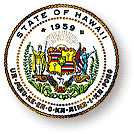"I think there is an opportunity to grant substantial tax relief to those who earn the least and also put more money towards education."
Gov. Linda Lingle
On the state's robust economy
State surplus growing
Lingle aims to use part of the $632.6 million for education and a tax cut for the poor
Democrats express concern that the funds will be consumed by public-worker raises
Forget about the budget blues. Hawaii is in the money.
After years of cutbacks and spending restrictions, the state's economy is soaring, and Gov. Linda Lingle is ready to spend more -- and cut taxes.
 While declining to give a specific figure, Lingle predicted yesterday that Hawaii's economy will continue to grow, meaning more taxes collected and more money pouring into the state's coffers.
While declining to give a specific figure, Lingle predicted yesterday that Hawaii's economy will continue to grow, meaning more taxes collected and more money pouring into the state's coffers.
There should be enough money, Lingle said, to both increase state educational spending and pay for tax cuts.
"The surplus is very healthy. I am excited about it, and I think it will be even beyond the projections," Lingle said in a meeting with reporters yesterday at the state Capitol.
Lingle will continue to press for a tax cut for Hawaii's working poor by increasing the standard tax deduction.
"They are the ones working in the service industry, the fast-food industry who are keeping the economy going, and we have to stop overtaxing them," Lingle said. "I have been telling the Legislature that for three years, and this is the year they have to step up and not just give rhetoric that they care about people."
"They are going to have to prove it by their actions and granting substantial tax relief," Lingle said.
The state is now projecting a surplus of $632.6 million for 2006-07, according to Georgina Kawamura, state budget director. Last month, the Council on Revenues predicted tax collections to rise 6 percent in 2006 and 6.6 percent in 2007.
The extra money, according to Lingle, is due to an enforced savings plan by her administration and a booming local economy.
"I really feel good that the fiscal integrity that we have tried to restore to the budget, combined with a strong economy, has resulted in a very large surplus," Lingle said.
While Lingle would not say how much extra money should be devoted to education, she was confident that education spending could be increased.
Last month, the Department of Education proposed increasing its $2 billion budget by $453 million.
Next year will be a time where "we can do both," Lingle said.
"I think there is an opportunity to grant substantial tax relief to those who earn the least and also put more money towards education. That would mean more money for the university, for early childhood education and K to 12, as well as some of the deferred maintenance," Lingle said.
The governor's optimism is not shared by Democrats in the Legislature.
Sen. Colleen Hanabusa, majority leader, predicts that large pay increases for public employees could swallow much of the surplus.
Because Lingle gave the University of Hawaii professors pay increases of 9 percent and 11 percent in the last two years of a six-year contract, Hanabusa says it is likely that other unions are going to want the same.
"My understanding is that if everyone gets the 9 and 11 percent increases, it would be $500 million, and then you have to add increased fringe benefits," Hanabusa (D, Nanakuli-Makena) said.
"How are you going to tell one group of employees they don't deserve the pay raise you already gave to another group?" Hanabusa said.
Senate President Robert Bunda, who has been an early supporter of a middle-class tax cut, says he continues to believe state taxes are too high.
But Bunda said if the state had to choose between returning money to taxpayers in the form of a rebate, such as $5 or $10, people would want the money to go to education.
Every dollar given in a rebate means $1 million less to the state, Bunda said.
"I think they would say to use the money to fix our schools," Bunda said.
Also, House Speaker Calvin Say is recommending state spending plans remain conservative.
"Overall, I am cautious, not pessimistic. But if there is any surplus, it should be put in the areas of higher and lower education," Say said.
Members of the House and Senate finance committees have spent the last month touring the neighbor island facilities to draw up spending plans for the 2006 legislative session, which opens Jan. 18.
Say said there is concern about the state's prison system, noting that the Lingle administration has not spent money for needed correctional facilities.
"She has talked about treatment facilities, but after three years there isn't much to show," Say said.
"Now with talk of tax cuts, that is just another form of cutting back in spending and cutting services," Say said.
"If the House and Senate are open to tax cuts, we would consider them, but there will be less money for other programs or facilities," he said.

